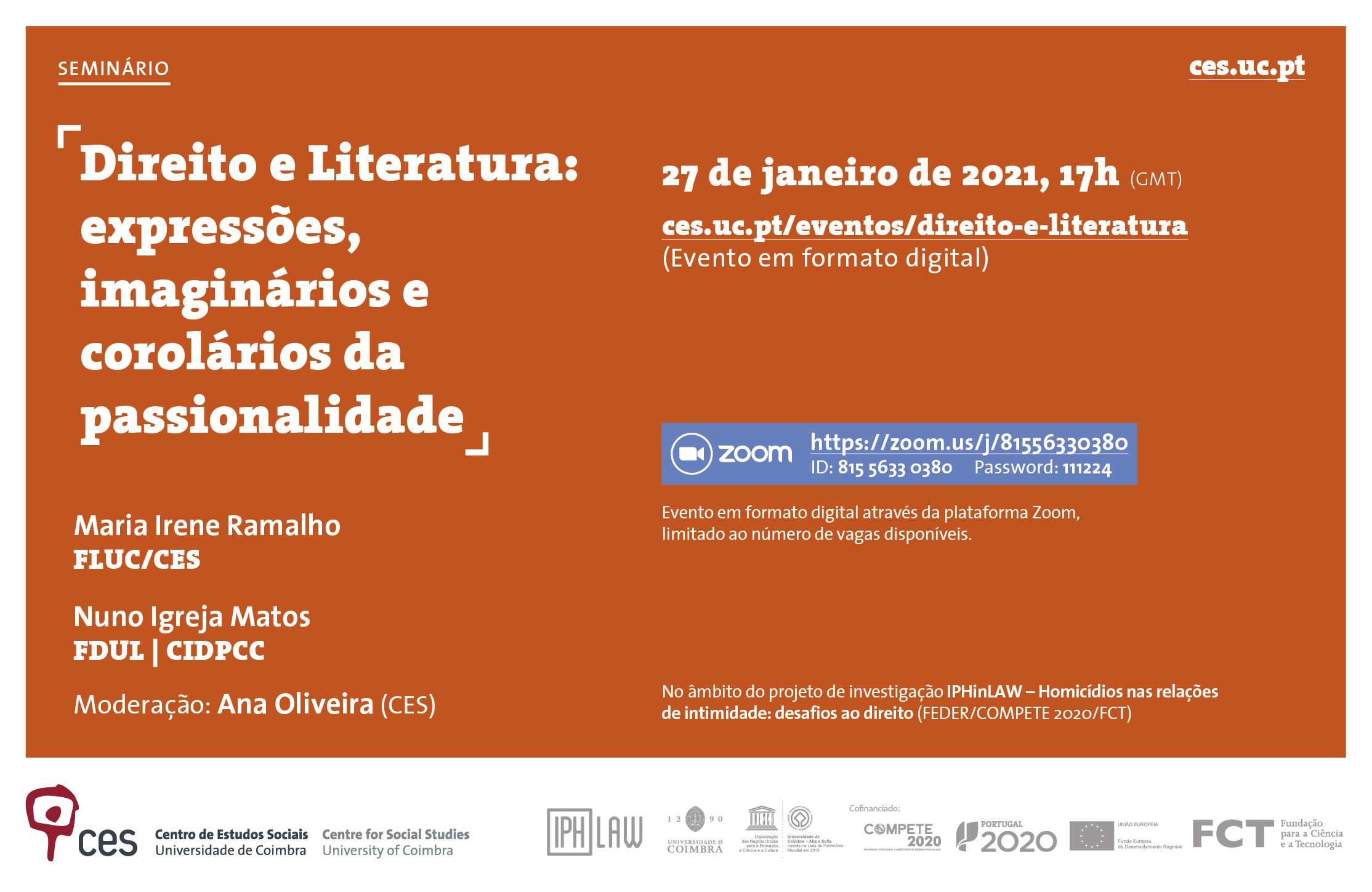Seminar
Law and Literature: expressions, imaginary and corollaries of passion
Maria Irene Ramalho
Nuno Igreja Matos
January 27, 2021, 17h00 (GMT)
Online event
Moderator: Ana Oliveira (CES)
About
This seminar is part of a series of seminars organised as part of the IPHinLAW research project - Intimate partner homicide: challenges to the law, which seeks to think critically about the law in its relationship with gender, sexuality and violence against women.
This first seminar seeks, in the legacy of the Law and Literature movement, inspiration to think about law and social phenomena within and in the relationship between legal and literary cultures. As a source of recognition and creation of value and meaning, both law and literature make up cultural archives on the interpretation and regulation of human subjects and experiences. It is from the different analytical and conceptual universes that different expressions, imaginary and corollaries of passion will be put into dialogue. The consecration of tragedy in literature and the hermeneutic and literary conception of law will be combined here to analyse the place and sense of guilt (legal and moral) in the, so-called, crimes of passion.
Bio notes
Maria Irene Ramalho is professor emerita of English, American Studies and Feminist Studies at the Faculty of Letters, University of Coimbra, where she was scientific coordinator of the doctoral programs in American Studies and Feminist Studies until September 2011. Since 1999, she is an International Affiliate of the Department of Comparative Literature at the University of Wisconsin-Madison, where she teaches regularly as a visiting professor. She has published extensively, both in Portuguese and in English, on different topics of English language literature and culture (with a special focus on American poetry), as well as on American studies, comparative literature, poetic theory, cultural studies and feminist studies. Her current research interests include problems of modernity and modernism, comparative poetics, poetry and philosophy, theories of American studies and theories of feminism. She is on the editorial board of several literature and culture journals.
Nuno Igreja Matos (FDUL | CIDPCC) is a Guest Assistant Professor at the Faculty of Law of the University of Lisbon, where he has been teaching Criminal Law I and II, and a researcher at the Centro de Investigação em Direito Penal e Ciências Criminais (CIDPCC). He is also an associate lawyer at Morais Leitão, Galvão Teles, Soares da Silva e Associados, working mainly in the area of law and criminal procedure. He recently published the study "Variações sobre a culpa nos crimes passionais a partir de "A Tragédia de Otelo" de William Shakespeare" [Variations on guilt in crimes of passion from William Shakespeare's "The Tragedy of Othello"]. Among others published works, he is also author of scientific articles on political criminal law ("Discursos Políticos e Direito Penal" [Political Speeches and Criminal Law]), public health criminal law ("Breves notas sobre o crime e a (propagação de) doença em tempos de pandemia" [Brief notes on crime and the (spread of) disease in times of pandemic], criminal law on terrorism ("Entre o cidadão e o inimigo" [Between the citizen and the enemy], co-authored) and new forms of crime ("Corrupção e Branqueamento: das relações incestuosas às (a)tipicidades" and "Branqueamento e Bitcoin: uma introdução", co-authored).
_________________
This activity will be accessible through the Zoom platform and will be limited to number of available places:
https://us02web.zoom.us/j/81556330380?pwd=UG5pNDZZU1JJV2h0ajRQaWJicEM1Zz09
ID: 815 5633 0380 | Password: 111224
We appreciate that all participants keep the microphone muted until the moment(s) of debate. The host of the session reserves the right to expel the participant who does not respect the rules of the room.
Online open access activities such as this one do not grant a declaration of participation since such document will only be provided in events that provide for prior registration and controlled access.


